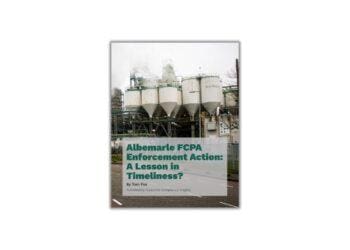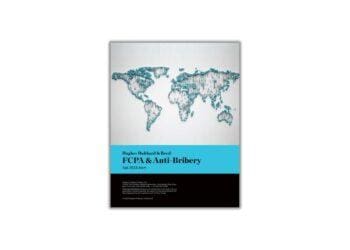Hard times bring out the best and the worst in people. It’s the worst the Department of Justice is concerned with. Michael Volkov discusses what the DOJ is doing to focus on fraudsters preying on public panic in response to the COVID-19 pandemic.
The Justice Department has alerted U.S. attorneys’ offices, as well as federal, state and local law enforcement of many of the common fraud schemes, and the DOJ has already prosecuted individuals and businesses for selling fake cures for COVID-19 online and other forms of fraud. In addition, given the large numbers of remote employees, the DOJ has warned about phishing emails from the World Health Organization and the Centers for Disease Control and Prevention and about fraudsters seeking donations for illegitimate or nonexistent charitable organizations.
The reported schemes include:
- Robocalls making fraudulent offers to sell respirator masks with no intent of delivery;
- Fake COVID-19-related apps and websites that install malware or ransomware;
- Phishing emails asking for money or presenting malware;
- Social media scams fraudulently seeking donations or claiming to provide stimulus funds if the recipient enters his or her bank account number;
- Sales of fake testing kits, cures, “immunity” pills and protective equipment;
- Fraudulent offers for free COVID-19 testing in order to obtain Medicare beneficiary information that is used to submit false medical claims for unrelated, unnecessary or fictitious testing or services;
- Prescription drug schemes involving the submission of medical claims for unnecessary anti-retroviral treatments or other drugs that are marketed as purported cures for COVID-19;
- Robberies of patients departing from hospitals or doctor offices;
- Threats of violence against mayors and other public officials; and
- Threats to intentionally infect other people.
To prosecute these schemes, the DOJ listed a number of criminal statutes that prohibit individuals and businesses engaging in fraudulent or otherwise illegal schemes. In particular, the DOJ noted that these COVID-19 fraudulent schemes may violate any number of provisions in Title 18 (see, e.g., 18 U.S.C. § 1341 (mail fraud); id. § 1343 (wire fraud); id. § 1030 (computer fraud); id. § 1347 (health care fraud); id. § 1349 (conspiracy to commit fraud); id. §§ 1028-1028A (identification fraud and aggravated identity theft); id. § 1040 (fraud in connection with major disasters and emergencies); and id. § 2320 (trafficking in counterfeit goods)).
Further, the sale of fake drugs and cures may be prohibited under Title 15 (see 15 U.S.C. § 1263(a) (introduction of misbranded or banned hazardous substances into interstate commerce)), may violate the Food, Drug and Cosmetic Act (see 21 U.S.C. § 333 (introduction of misbranded or adulterated drug or device into interstate commerce)) or may violate the Consumer Product Safety Act (see 15 U.S.C. § 2068 (sale, manufacture, distribution or import of a consumer product or other product that is not in conformity with consumer-product-safety regulations)).
If fraudsters engage in malicious hoaxes, threats against specific individuals or intentional exposure and infection of others with COVID-19, such conduct may fall under a range of criminal statutes relating to COVID-19 as “biological agent” under 18 U.S.C. § 178(1) and therefore implicate terrorism-related statutes (see, e.g., id. § 175 (development/possession of a biological agent for use as a weapon); id. § 875 (threats by wire); id. § 876 (threats by mail); id. § 1038 (false information and hoaxes regarding biological weapons); id. § 2332a (use of a weapon involving a biological agent)).
Finally, the DOJ has warned against conspiracies between individuals or businesses to fix prices, rig bids or allocate markets with respect to COVID-19 materials as criminal antitrust violations (see 15 U.S.C. § I). Monopolization or anticompetitive agreements related to critical materials needed to respond to COVID-19 can be pursued civilly under the Sherman and the Clayton Antitrust Acts (see, e.g., 15 U.S.C. § I (anticompetitive agreements); id. § 2 (monopolization); and id. § 14 (exclusive dealings)). And when the United States is injured as a result of those practices, the government may bring suit to recover its damages (see id. § 15a (damages actions when the government is the victim)).
This article was republished with permission from Michael Volkov’s blog, Corruption, Crime & Compliance.



 Michael Volkov is the CEO of The Volkov Law Group LLC, where he provides compliance, internal investigation and white collar defense services. He can be reached at
Michael Volkov is the CEO of The Volkov Law Group LLC, where he provides compliance, internal investigation and white collar defense services. He can be reached at 






